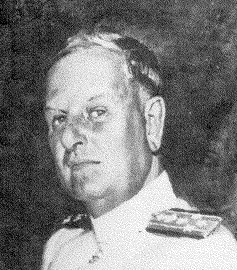The Attack on Pearl Harbor
 Welcome to the Pearl Harbor revisionism page. If the name of Admiral
Husband Edward Kimmel means something to you and you believe that he
got a rotten deal from the Administration, you've come to the right place.
And if you don't know anything about Pearl Harbor and the Admiral, drop
in and learn something about a part of history that certain people high in
our government would prefer to sweep under the rug.
Welcome to the Pearl Harbor revisionism page. If the name of Admiral
Husband Edward Kimmel means something to you and you believe that he
got a rotten deal from the Administration, you've come to the right place.
And if you don't know anything about Pearl Harbor and the Admiral, drop
in and learn something about a part of history that certain people high in
our government would prefer to sweep under the rug.
Pearl Harbor Revisionism -- A Problematic Term?
One of the difficulties in discussing the issues related to Pearl Harbor is the recent hijacking of the word "revisionism" by certain groups, particularly the Holocaust deniers. These groups seek to bend history to their own ends, and as such have sullied a perfectly legitimate word in historical scholarship.
Pearl Harbor revisionism, as the term has historically been used, is historical scholarship which disputes the official Administration judgement that the unreadiness of US forces when the Japanese attacked Pearl Harbor on December 7, 1941 was solely the fault of the local commanders in Hawaii, Admiral Kimmel and his colleague in the Army, General Walter C. Short. Pearl Harbor revisionism comes in two major forms, the First Order and the Second Order.
First Order revisionism holds President Franklin D. Roosevelt personally responsible for the debacle at Pearl Harbor and regards him as having used the incident as a means to get the United States involved in the War and subsequently used the Hawaiian commanders as scapegoats to shift public attention away from the activities of the Administration.
First Order revisionism has two sub-forms, the strong form and the weak form.
Strong form First Order revisionism holds that Roosevelt specifically planned to bring about an attack on Pearl Harbor itself. According to this theory, Roosevelt deliberately left the Hawaiian commanders in an untenable position while he manipulated the Japanese into making an attack, then withheld the information on the pending attack from the Hawaiian commanders so that they would be left helpless.
Weak form First Order revisionism holds that Roosevelt was trying to set up some sort of incident, perhaps an attack on a single ship (like the Gulf of Tonkin Incident in Vietnam, which the Johnson Administration used to escalate US activity in that fiasco), but got more than he bargained for. Embarrassed, he scapegoated the Hawaiian commanders to cover his own mistakes.
Second Order revisionism blames more broad-based mismanagement by the Administration rather than personal malice on Roosevelt's part for the lack of warning prior to the attack. Roosevelt's primary moral fault lay in his mishandling of things afterward to cover the Administration's act by fixing the blame on the Hawaiian commanders.
Some Second Order revisionists believe that the Administration's mismanagement was systematic and that no specific person should bear the preponderance of the blame. More recent Second Order revisionists, including Edward Beach, have focussed blame on Admiral Richmond Kelly Turner, whose tyrannical and overbearing behavior (the so-called "Mutiny on the Second Deck") prevented vital intelligence data from flowing to Hawaii.
During the War, national security interests prevented a thorough investigation of the issue. After the War was over, a new complication had entered the scene because President Roosevelt had died in the meantime. Because of this, the question of responsibility for Pearl Harbor became intricately intermeshed with Roosevelt's posthumous reputation.
Many people came to feel that attempts to suggest that Roosevelt was in part responsible for the debacle at Pearl Harbor were slanders on his reputation rather than the sort of legitimate criticism that all leaders should be subject to. Thus emotional issues overshadowed historical ones and the Hawaiian commanders found themselves stymied in their efforts to clear their names in their own lifetimes. Their descendants have continued the fight to this day, with only partial success.
The Pearl Harbor bibliography, a listing of all known books and articles related to the Japanese attack on Pearl Harbor.
Links to various sites related to Pearl Harbor.
Last updated January 9, 2014.
